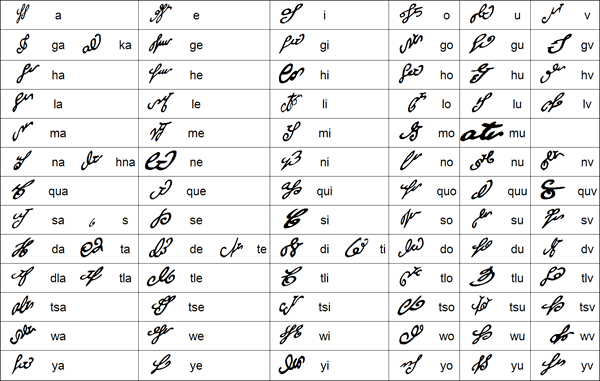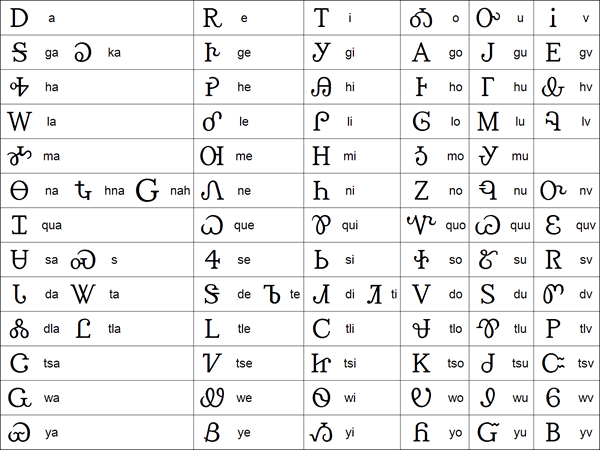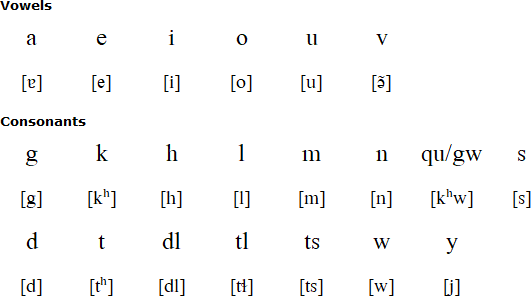Sequoyah's descendants claim that he was the last surviving member of his tribe's scribe clan and the Cherokee syllabary was invented by persons unknown at a much earlier date. No archaeological evidience has been found to verify this claim.
By 1820 thousands of Cherokees had learnt the syllabary, and by 1830, 90% were literate in their own language. Books, religious texts, almanacs and newspapers were all published using the syllabary, which was widely used for over 100 years.
Today the syllabary is still used; efforts are being made to revive both the Cherokee language and the Cherokee syllabary, and Cherokee courses are offered at a number of schools, colleges and universities.
Notable features
- Type of writing system: syllabary
- Direction of writing: left to right in horizontal lines
- Used to write: Cherokee (ᏣᎳᎩ), a Southern Iroquoian language spoken by around 22,500 people in North Carolina (Tetsas / ᏖᏣᏍ) and Oklahoma (Asgaya gigageyi / ᎠᏍᎦᏯ ᎩᎦᎨᏱ).
Hand-written Cherokee syllabary

Printed Cherokee syllabary

Cherokee pronunciation

Notes
- The consonants g and d are voiceless in certain positions and in some dialects.
- In the Otali (Oklahoma) dialect, a is often realised as /ɒ/; ts can be pronounced /ʃ/, /ʒ/, /sʰ/, /ʤ/ or /ʧ/; and w is pronounced /ɰ/.
- The Otali dialect has six tones, while the Quallah (Eastern) dialect usually (at most) only bears a pitch accent.
You can hear the sounds of Cherokee at:
http://www.cherokee.org/Extras/Downloads/syllabary.html
Sample text in Cherokee
Transliteration
Nigada aniyvwi nigeguda'lvna ale unihloyi unadehna duyukdv gesv'i. Gejinela unadanvtehdi ale unohlisdi ale sagwu gesv junilvwisdanedi anahldinvdlv adanvdo gvhdi.Translation
All human beings are born free and equal in dignity and rights. They are endowed with reason and conscience and should act towards one another in a spirit of brotherhood.(Article 1 of the Universal Declaration of Human Rights)
Links
Information about the Cherokee language and syllabaryhttp://www.native-languages.org/cherokee.htm
http://en.wikipedia.org/wiki/Cherokee_language
http://sheikhjahbooty.wordpress.com/2011/04/08/the-mystery-of-why-the-cherokee-syllabary-sucks/
Online Cherokee lessons
http://www.youtube.com/user/tsasuyeda
http://tsasuyed.blogspot.com
http://www.angelfire.com/nj/nativecrafts/language.html
http://www.thepeoplespaths.net/Cherokee/CherokeeRecordings/language/Taylor-CherokeeLanguage.html
http://www.nativenashville.com/language/tutor_tsalagi.php
http://www.cherokee.org/AboutTheNation/Culture/Language/31863/Information.aspx
Online Cherokee dictionaries
http://www.wehali.com/tsalagi/
http://www.manataka.org/page122.html
Phrases in Cherokee
http://public.csusm.edu/public/raven/cherokee.dir/cherlexi.html
http://mypeoplepc.com/members/cherlyn/onefeather/id7.html
http://www.ctc.volant.org/cherokee/Mirror/cherokeewords.html
http://www.manataka.org/page122.html
Cherokee fonts
http://www.cherokee.org/Culture/CherokeeFont/Downloads.aspx http://www.wazu.jp/gallery/Fonts_Cherokee.html
http://www.gnu.org/software/freefont/
Cherokee transliteration system
http://www.translitteration.com/transliteration/en/cherokee/sequoyah/
Information about Chief Sequoyah and the Cherokee Syllabary, written by his descendants: http://www.enformy.com/dma-ls05.htm
Sequoyah Birthplace Museum
http://www.sequoyahmuseum.org
Echota Tsalagi Language Revitalization Project
http://www.auburn.edu/outreach/dl/echota/
Cherokee Observer - online Cherokee newspaper
http://www.cherokeeobserver.org
Cherokee Publications - Native American books, tapes, etc.
http://www.nativecollections.com/LanguageCourses.html
Place names of Cherokee origin
http://chenocetah.wordpress.com
No comments:
Post a Comment
Note: Only a member of this blog may post a comment.